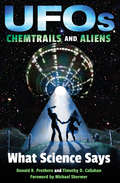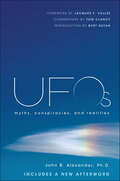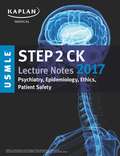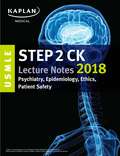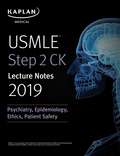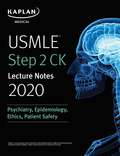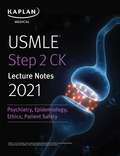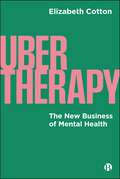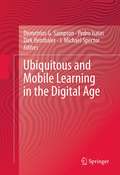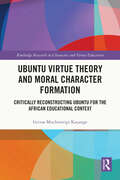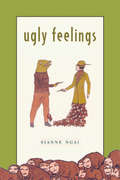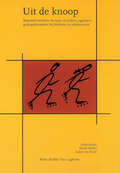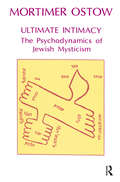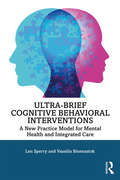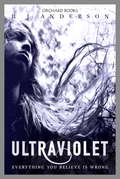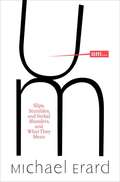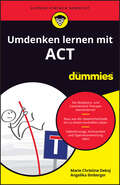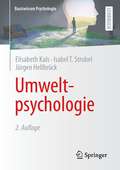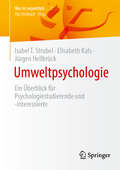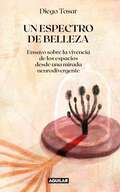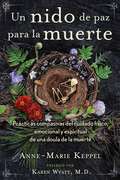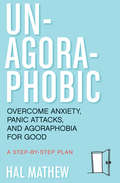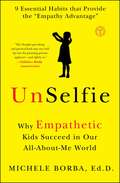- Table View
- List View
UFOs, Chemtrails, and Aliens: What Science Says
by Donald R. Prothero Timothy D. CallahanA wide-ranging survey offers &“entertainment as well as wisdom for everyone who&’s ever wondered what&’s behind so many conspiracy theories and paranormal phenomena&” (Publishers Weekly). UFOs. Aliens. Strange crop circles. Giant figures scratched in the desert surface along the coast of Peru. The amazing alignment of the pyramids. Strange lines of clouds in the sky. The paranormal is alive and well in the American cultural landscape. In UFOs, Chemtrails, and Aliens, Donald R. Prothero and Tim Callahan explore why such demonstrably false beliefs thrive despite decades of education and scientific debunking. Employing the ground rules of science and the standards of scientific evidence, Prothero and Callahan discuss a wide range of topics including the reliability of eyewitness testimony, psychological research into why people want to believe in aliens and UFOs, and the role conspiratorial thinking plays in UFO culture. They examine a variety of UFO sightings and describe the standards of evidence used to determine whether UFOs are actual alien spacecraft. Finally, they consider our views of aliens and the strong cultural signals that provide the shapes and behaviors of these beings. While their approach is firmly based in science, Prothero and Callahan also share their personal experiences of Area 51, Roswell, and other legendary sites, creating a narrative that is sure to engross both skeptics and believers.
UFOs: Myths, Conspiracies, and Realities
by John B. AlexanderA never-before-heard firsthand account of a government insider's experience on the cutting edge of UFO exploration; includes a new afterword"Forget everything you think you know about UFOs - this insider's account exposes the reality... Packed with top grade information, insightful analysis and fascinating anecdotes, Alexander's interesting and controversial book sets the gold standard for titles on this subject." –Nick Pope, author of Open Skies, Closed Minds"Changes the playing field for both true believers and skeptics alike. Alexander strongly warns, be careful what you wish for when asking for presidential intervention. Success could set the field of ufology back decades." --George Noory, host of Coast to Coast AMWhile still on active duty in the U.S. Army during the 1980s, Colonel John B. Alexander, Ph.D. created an interagency group to explore the controversial topic of UFOs. All members held Top Secret clearance. What they discovered was not at all what was expected. UFOs covers the numerous cases they saw, and answers questions like:• What was really in Hanger 18? • Did a UFO land at Holloman Air Force Base? • What happened at Roswell? • What is Majestic 12? • What is the Aviary? • What does the government know about UFOs? • What has happened with disclosure in other countries? • Has the U.S. reverse engineered a UFO? • Why don't presidents get access to UFO info? UFOs is at once a complete account of Alexander's findings, and a call to action. There are no conspiracy theories here—only hard facts—but they are merely the beginning. Foreword by Jacques F. ValleeIntroduction by Burt RutanCommentary by Tom Clancy
USMLE Step 2 CK Lecture Notes 2017: Psychiatry, Epidemiology, Ethics, Patient Sa
by KaplanThe official Kaplan Lecture Notes for USMLE Step 2 CK cover the comprehensive information you need to ace the USMLE Step 2 and match into the residency of your choice.Up-to-date. Updated annually by Kaplan's all-star faculty.Highly illustrated. Includes color images and tables.Integrated. Packed with bridges between specialties and basic science.Learner-efficient. Organized in outline format with high-yield summary boxes.Trusted. Used by thousands of students each year to succeed on the USMLE Step 2.
USMLE Step 2 CK Lecture Notes 2018: Psychiatry, Epidemiology, Ethics, Patient Safety
by Kaplan MedicalKaplan Medical's USMLE Step 2 CK Lecture Notes 2018: Psychiatry, Epidemiology, Ethics, Patient Safety offers in-depth review with a focus on high-yield topics – a comprehensive approach that will help you deepen your understanding while focusing your efforts where they'll count the most.Used by thousands of medical students each year to succeed on USMLE Step 2, Kaplan's official lecture notes are packed with full-color images and clear review.The Best ReviewOrganized in outline format with high-yield summary boxes for efficient studyBridges between specialties and basic science highlighted throughoutUpdated annually by Kaplan’s all-star expert facultyLooking for more prep? Our USMLE Step 2 CK Lecture Notes 2018: 5-Book Set has this book, plus the rest of the 5-book series.
USMLE Step 2 CK Lecture Notes 2019: Psychiatry, Epidemiology, Ethics, Patient Safety (Kaplan Test Prep)
by Kaplan MedicalThe only official Kaplan Lecture Notes for USMLE Step 2 CK cover the comprehensive information you need to ace the USMLE Step 2 and match into the residency of your choice.Up-to-date. Updated annually by Kaplan's all-star faculty.Highly illustrated. Includes color images and tables.Integrated. Packed with bridges between specialities and basic science.Learner-efficient. Organized in outline format with high-yield summary boxes.Trusted. Used by thousands of students each year to succeed on the USMLE Step 2.
USMLE Step 2 CK Lecture Notes 2020: Psychiatry, Epidemiology, Ethics, Patient Safety (Kaplan Test Prep)
by Kaplan MedicalThe official Kaplan Lecture Notes for USMLE Step 2 CK cover the comprehensive information you need to ace the USMLE Step 2 and match into the residency of your choice. Up-to-date. Updated annually by Kaplan’s all-star faculty. Highly illustrated. Includes color images and tables. Integrated. Packed with bridges between specialities and basic science. Learner-efficient. Organized in outline format with high-yield summary boxes. Trusted. Used by thousands of students each year to succeed on the USMLE Step 2.
USMLE Step 2 CK Lecture Notes 2021: Psychiatry, Epidemiology, Ethics, Patient Safety (Kaplan Test Prep)
by Kaplan MedicalThe official Kaplan Lecture Notes for USMLE Step 2 CK cover the comprehensive information you need to ace the USMLE Step 2 and match into the residency of your choice. Up-to-date. Updated annually by Kaplan&’s all-star faculty. Highly illustrated. Includes color images and tables. Integrated. Packed with bridges between specialities and basic science. Learner-efficient. Organized in outline format with high-yield summary boxes. Trusted. Used by thousands of students each year to succeed on the USMLE Step 2.
UberTherapy: The New Business of Mental Health
by Elizabeth CottonUberTherapy is the essential guide to the rise of digital therapy for anyone working in, researching or using mental health services. This timely book explores the emerging uberization of therapy through algorithmic control, datafication of despair and attrition by design. Analysing the deployment of e-commerce business models, this book makes a compelling case that the rise of ‘therapeutic Tinder’ allows would-be clients to sidestep the deep, uncomfortable work of therapy. UberTherapy offers a defence for the irreplaceable value of human therapists and a roadmap for preserving the legacies of real therapy in the digital world.
Ubiquitous and Mobile Learning in the Digital Age
by Dirk Ifenthaler J. Michael Spector Pedro Isaias Demetrios G. SampsonThis edited volume with selected expanded papers from CELDA (Cognition and Exploratory Learning in the Digital Age) 2011 (http://www.celda--conf.org/) will focus on Ubiquitous and Mobile Informal and Formal Learning in the Digital Age, with sub-topics: Mobile and Ubiquitous Informal and Formal Learning Environments (Part I), Social Web Technologies for new knowledge representation, retrieval, creation and sharing in Informal and Formal Educational Settings (Part II), Virtual Worlds and Game--based Informal and Formal Learning (Part III), Location--based and Context-- Aware Environments for Formal and Informal Learning Integration (Part IV) There will be approximately twenty chapters selected for this edited volume from among peer--reviewed papers presented at the CELDA (Cognition and Exploratory Learning in the Digital Age) 2011 Conference in Rio de Janeiro, Brazil in November, 2011.
Ubuntu Virtue Theory and Moral Character Formation: Critically Reconstructing Ubuntu for the African Educational Context (Routledge Research in Character and Virtue Education)
by Grivas Muchineripi KayangeThis book investigates the ubuntu theory-based conception of virtue and moral character formation in the northern, western, and eastern regions of Africa, suggesting a critical reconstruction of ubuntu by conceptualising the four different forms of practices in moral character formation. Arguing for the critical reconstruction of ubuntu virtue theory as more nuanced than simply the standard ubuntu normative virtue theories (which give priority to the community as the sole locus for understanding virtues and character formation in Africa), the book builds a comprehensive model of virtue and moral character formation that draws insights from the reconstructed notion of ubuntu and other theories within and beyond the African thought. Chapters feature experience from across Africa including Malawi, Zambia, Zimbabwe, Uganda, Kenya, and South Africa, and centre on topics such as traditional cultural views and practices, political systems in various nations, neoliberalist thought, and primary, secondary and tertiary education systems in Africa and further afield. This is a valuable resource for scholars, academics, and postgraduate students, working in the fields of moral and values education, philosophy of education, and the theory of education more broadly. Those also interested in educational psychology may also find the volume of interest.
Ugly Feelings
by Sianne NgaiNgai mobilizes the aesthetics of ugly feelings to investigate not only ideological and representational dilemmas in literature--with a particular focus on those inflected by gender and race--but also blind spots in contemporary literary and cultural criticism.
Uit de knoop
by Nicole Muller Gidia Jacobs Esther Ten BrinkKindertherapeuten, –psychologen, –psychiaters en pedagogen laten zich de laatst jaren steeds meer inspireren door de cognitief georiënteerde gedragstherapieën. De rationeel–emotieve therapie (RET) is zeer praktisch gericht en levert een rijkdom aan gevoels–, gedrags– en cognitieve interventies. Uit de knoop is het eerste omvangrijke Nederlandstalige boek dat speciaal geschreven is voor toepassingen bij kinderen, jeugdigen en hun ouders.De praktijk van de therapie staat in dit boek centraal. Het is een handleiding waarmee een cognitieve gedragstherapie vorm gegeven kan worden. Het boek biedt voor ervaren professionals de mogelijkheid tot herstructurering van hun sessies. Zij vinden in de talloze voorbeelden en dialogen nieuwe wegen om hun cliëntencontacten te intensiveren. Voor professionals met minder ervaring op dit gebied biedt het boek een stap voor stap benadering om een volledige therapie op te bouwen.
Ultimate Intimacy: The Psychodynamics of Jewish Mysticism
by Mortimer OstowThis book introduces the psychoanalytic study of the Kabbalah as a serious discipline. It illustrates the applicability of psychodynamic concepts to Jewish mysticism and the "apocalyptical complex" and essays on specific incidents in the Bible and the Kabbalah.
Ultra-Brief Cognitive Behavioral Interventions: A New Practice Model for Mental Health and Integrated Care
by Len Sperry Vassilia BinensztokUltra-Brief Cognitive Behavioral Interventions showcases a new practice model to address both physical and psychological health issues in mental health and integrated care settings, utilizing focused interventions in brief treatment formats. This unique text offers a toolkit of effective interventions and methods – including cognitive behavioral therapy (CBT) methods that can be used in a very brief time frame of 10–20 minutes – that can be quickly and efficiently applied to ameliorate specific symptoms. The 20 most common interventions in short-term therapy practiced in mental health and integrated care settings are illustrated in session transcriptions of the full course of focused therapy, with common presentations such as depression, anxiety and acute distress, pain, sleep problems, and weight problems. This book prepares emerging and experienced counselors and therapists to provide short-term therapy for their clients and equips them with the necessary skills to meet the challenges facing mental health care today and in the future.
Ultraviolet (Carolrhoda Ya Ser.)
by R.J. AndersonOnce upon a time there was a girl who was special.This is not her story.Unless you count the part where I killed her.Sixteen-year-old Alison has been sectioned in a mental institute for teens, having murdered the most perfect and popular girl at school. But the case is a mystery: no body has been found, and Alison's condition is proving difficult to diagnose. Alison herself can't explain what happened: one minute she was fighting with Tori - the next she disintegrated. Into nothing. But that's impossible. Right?
Um...Slips, Stumbles, and Verbal Blunders, and What They Mean
by Michael ErardJournalist and language expert Erard argues that the secrets of human speech are present in our verbal blunders as he studies and interprets speech errors--hilarious bloopers, Spoonerisms, and malapropisms.
Umdenken lernen mit ACT für Dummies (Für Dummies)
by Marie Christine Dekoj Angelika IlmbergerRaus aus der Gewohnheitsfalle hin zu einem sinnhaften Leben Möchten Sie Ihrem Leben mehr Sinn geben und Ihren Werten entsprechend leben? Die Akzeptanz- und Commitment-Therapie kann Ihnen dabei helfen. Üben Sie sich in Akzeptanz, also Dinge und Gefühle anzunehmen, wie sie sind. Lernen Sie, der Gewohnheitsfalle zu entfliehen und anders mit Ihren Gedanken und Gefühlen umzugehen. Üben Sie sich in Achtsamkeit und dem Leben im Hier und Jetzt. Sorgen Sie durch Selbstmitgefühl und Selbstfürsorge dafür, dass es Ihnen gut geht. Und finden Sie heraus, welche Werte Ihnen im Leben wirklich wichtig sind und wie Sie sie mit engagiertem Handeln verfolgen können. Sie erfahren Wie Sie eine andere Perspektive auf sich selbst entwickeln Wie Sie Gewohnheiten ändern, die Ihnen nicht guttun Wie Sie mit dem ständigen Gedankenkarussel und Gefühlschaos umgehen
Umgang mit Grenzverletzungen: Professionelle Standards und ethische Fragen in der Psychotherapie (Psychotherapie: Praxis)
by Andrea SchleuDas Buch setzt sich lebendig und anhand vieler anschaulicher Beispiele mit schwierigen Behandlungssituationen in der Psychotherapie auseinander. Einen Orientierungsrahmen bieten Ethikleitlinien, Berufsordnung und wissenschaftliche Erkenntnisse, die jedoch keine abschließenden Antworten geben können. Das Buch führt in einen offenen Diskurs über den Umgang mit Irrtum, Verwicklung, Grenzen und Grenzverletzungen, von dem sowohl Aus- und Weiterbildungsteilnehmer als auch erfahrene Kollegen profitieren können. Vor dem Hintergrund des aktuellen Stands der Forschung und der rechtlichen Rahmenbedingung wird jenseits von Tabuisierung und Schweigen ein hilfreicher Umgang mit der Dynamik von Grenzverletzungen und Machtmissbrauch in der Psychotherapie entwickelt. Die teils gravierenden Folgen für Patienten und Psychotherapeuten sowie die gesamte Profession werden eingehend erörtert und Maßnahmen zur Prävention dargestellt. Aus dem Inhalt: Grenzverletzungen – Abstinenzverletzungen – Machtmissbrauch – Machtgefälle – Behandlungsfehler – Regelverstöße – Nebenwirkungen – Therapieschäden – professionelle und ethische Standards in der Psychotherapie – Ethikverein – Folgetherapie – Prävention – politische Konsequenzen. Die Autorin: Dr. med. Andrea Schleu, Fachärztin für Psychotherapeutische Medizin und Innere Medizin, Psychoanalyse (DGPT), EMDR (EMDRIA), Spez. Psychotraumatologie (DeGPT), Supervision (DGSv), Dozentin, Referentin, Beraterin und Vorsitzende Ethikverein e.V.
Umweltfreundliches Verhalten am Arbeitsplatz: Ökologisch nachhaltige Organisationen gestalten (SDG - Forschung, Konzepte, Lösungsansätze zur Nachhaltigkeit)
by Hannes Zacher Sarah Rietze Clara KühnerDieses Buch vereint die arbeits- und organisationspsychologische Forschung zu ökologischer Nachhaltigkeit mit praxisnahen Lösungen. Es beleuchtet individuelle Einflussfaktoren auf umweltfreundliches Verhalten, sowie die Rolle von Führung („Green Leadership&“), Personalpraktiken („Green HRM&“), Teamarbeit und Organisationskultur. Es gibt konkrete Werkzeuge an die Hand und beschreibt evidenzbasierte Interventionsansätze für die ökologische Transformation. Fallbeispiele und Interviews machen deutlich, wie Organisationen ihre Prozesse und Kulturen gestalten können, um umweltfreundliches Verhalten zu fördern.
Umweltpsychologie (Basiswissen Psychologie)
by Elisabeth Kals Jürgen Hellbrück Isabel T. StrubelDie Umweltpsychologie befasst sich mit Mensch-Umwelt-Wechselwirkungen als Beziehungen zwischen der physisch-materiellen und der soziokulturellen Außenwelt sowie menschlichem Erleben und Verhalten. Diese vollständig überarbeitete zweite Auflage gibt einen gut strukturierten, klar verständlichen Überblick über die Themen und Entwicklungen dieser immer bedeutsamer werdenden Teildisziplin der Psychologie und macht deutlich, dass die Umweltpsychologie ein hochrelevantes Forschungs- und Anwendungsfeld der Gegenwart und Zukunft ist.
Umweltpsychologie: Ein Überblick für Psychologiestudierende und -interessierte (Was ist eigentlich …?)
by Elisabeth Kals Jürgen Hellbrück Isabel T. StrubelDieses Lehrbuch gibt einen kurzen Überblick über das Anwendungsfach Umweltpsychologie. Die Umweltpsychologie befasst sich mit Mensch-Umwelt-Wechselwirkungen als Beziehungen zwischen der physisch-materiellen und der soziokulturellen Außenwelt sowie menschlichem Erleben und Verhalten. Sowohl psycho-soziale und gesundheitspsychologische Wirkungen der Umwelt auf den Menschen als auch psychologische Bedingungsfaktoren menschlicher Einflüsse auf die Umwelt werden in den Blick genommen. Das Buch bietet allen an psychologischen Themen Interessierten einen ersten, gut verständlichen Einblick in das Themengebiet der Umweltpsychologie.
Un espectro de belleza: Ensayo sobre la vivencia de los espacios desde una mirada neurodivergente
by Diego TosarDiego Tosar nos invita a ir en busca de aquello que nos une con las personas del espectro autista, más que de aquello que nos diferencia, para proponer otra posible arquitectura, una arquitectura repleta de sensibilidad para todos. Este libro es un intento por ampliar la mirada sobre la concepción de los espacios, los cuales no contemplan aún la diversidad que conforma nuestra sociedad. Diego Tosar lleva adelante un análisis reflexivo sobre las características de los entornos discapacitantes para las personas dentro del espectro autista. Propone así estrategias viables para modificar el sistema, en la búsqueda de garantizar un entorno que resulte más amable y que favorezca la convivencia. Una forma de interpretar el propósito de este ensayo es el de lograr una mejor comprensión sobre cómo percibe, cómo procesa y cómo se ve afectada la conducta de diferentes personas dentro del espectro autista, en relación a los estímulos que se le presentan en los ambientes. Por otra parte, este libro es también el ensayo de un padre, de profesión arquitecto, que desde el desconcierto intenta amorosamente comprender a su hijo. Esta vivencia personal se convierte en el motor que impulsa una reflexión personal y profesional ampliada y comprometida.
Un nido de paz para la muerte: Prácticas compasivas del cuidado físico, emocional y espiritual de una doula de la muerte
by Anne-Marie Keppel• Comparte prácticas para calmar las emociones, técnicas de respiración para reducir la ansiedad y el dolor, formas de reducir el estrés durante el proceso de muerte activa y técnicas para cuidar físicamente a los moribundos• Explora ceremonias y pautas de límites energéticos, reiki y técnicas de apoyo ancestrales, además de cuidados a base de hierbas para nutrir y curar en el aspecto espiritual• Presenta métodos de autocuidado para sobrellevar el duelo, ideas de &“cosas que hacer&” cuando no hay nada que hacer, prácticas para contemplar su propia mortalidad y orientación para hablar con los niños sobre la muerte y el morir• Ganador del premio &“IPPY&” de editor independiente de 2020Así como podemos preparar un nido para alguien que está a punto de dar a luz, también podemos preparar con amor un nido para alguien que está muriendo.En esta guía práctica y compasiva, la educadora de doulas de la muerte Anne-Marie Keppel incorpora técnicas antiguas y modernas, prácticas de atención plena y apoyo a base de hierbas para mostrar cómo cualquiera puede cuidar a los moribundos, ya sea en casa, en un hospicio o incluso en la UCI. Ella desmitifica el proceso de muerte mientras explica lo que atraviesa el cuerpo durante el final de la vida y presenta prácticas para calmar las emociones y otras formas de reducir el estrés y la ansiedad durante el proceso de muerte activa. La autora proporciona técnicas para cuidar a los moribundos físicamente, incluyendo métodos para ayudar a las personas postradas en cama. Comparte ceremonias y pautas de los límites energéticos, reiki y técnicas de apoyo ancestrales, además de cuidados a base de hierbas para nutrir y curar en el aspecto espiritual.Anne-Marie también brinda apoyo a los cuidadores y seres queridos por medio de métodos de autocuidado para superar el duelo, ideas sobre &“cosas que hacer&” cuando no hay nada que hacer y prácticas de atención plena para contemplar la propia mortalidad. También ofrece visualizaciones y técnicas para hablar con los niños sobre la muerte y el morir.
Un-Agoraphobic: Overcome Anxiety, Panic Attacks, and Agoraphobia for Good
by Hal Mathew&“A highly structured hour-by-hour plan for each day . . . delivers assurance to those suffering from panic attacks and agoraphobia.&”—Library JournalThe National Institute of Mental Health estimates that nearly 1.5% of the population of the United States suffers from agoraphobia at some point in their lifetime. That&’s 4.5 million people.You are not alone. No matter how alone you may feel, you are not alone.Former journalist, social worker, and amateur actor Hal Mathew knows exactly what it&’s like &“to fear fear,&” which is how he describes the dread feeling that kept him from leaving home (or at least leaving sober and at ease) for nearly 30 years. Then, slowly but with grit and determination, he began to piece together a plan for overcoming his phobias and resuming a regular life. And it worked. And then he started teaching other people how to do it. Now he has written this book to share his self-care plan with you.Hal will guide you through writing practices, visualization techniques, even cooking and eating routines to help you feel anchored and safe and ready to take your first trips out of the house. He&’ll answer your questions, offer general survival tips, and even includes a special chapter for your spouses and loved ones. The good news is that recent neuroscience research shows us that the brain is retrainable—at any age. You can stop feeling like this. You will stop feeling like this. With Hal&’s help, you will be able to retrain your body and brain so you can take your life back. Totally and forever.
UnSelfie: Why Empathetic Kids Succeed in Our All-About-Me World
by Michele BorbaBestselling author Michele Borba offers a 9-step program to help parents cultivate empathy in children, from birth to young adulthood--and explains why developing a healthy sense of empathy is a key predictor of which kids will thrive and succeed in the future.Is the Selfie Syndrome Undermining Our Kids' Future? Teens today are 40 percent less empathetic than they were thirty years ago. Why is a lack of empathy--which goes hand-in-hand with the self-absorption epidemic Dr. Michele Borba calls the Selfie Syndrome--so dangerous? First, it hurts kids' academic performance and leads to bullying behaviors. Also, it correlates with more cheating and less resilience. And once children grow up, a lack of empathy hampers their ability to collaborate, innovate, and problem-solve--all must-have skills for the global economy. In UnSelfie Dr. Borba pinpoints the forces causing the empathy crisis and shares a revolutionary, researched-based, 9-step plan for reversing it. Readers will learn: -Why discipline approaches like spanking, yelling, and even time-out can squelch empathy -How lavish praise inflates kids' egos and keeps them locked in "selfie" mode -Why reading makes kids smarter and kinder -How to help kids be Upstanders--not bystanders--in the face of bullying -Why self-control is a better predictor of wealth, health, and happiness than grades or IQ -Why the right mix of structured extracurricular activities and free play is key for teaching collaboration -How to ignite a Kindness Revolution in your kids and community The good news? Empathy is a trait that can be taught and nurtured. Dr. Borba offers a framework for parenting that yields the results we all want: successful, happy kids who also are kind, moral, courageous, and resilient. UnSelfie is a blueprint for parents and educators who want to kids shift their focus from I, me, and mine...to we, us, and ours.
